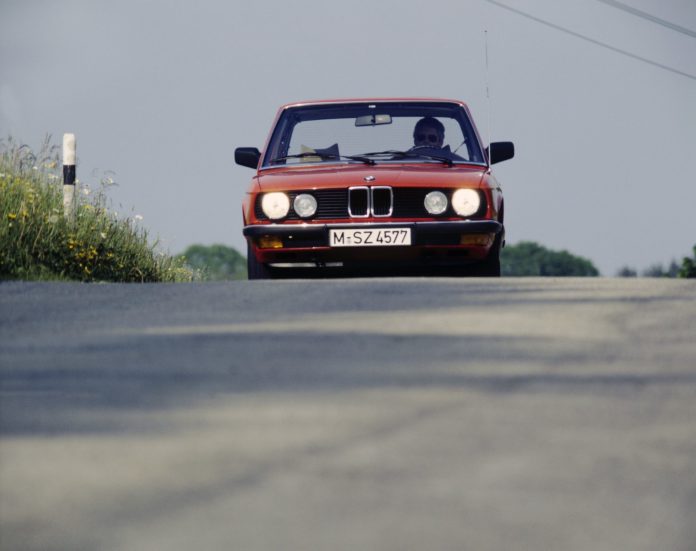The BMW 524td – The Best Diesel Car You Could Buy in 1983
Ask any Brit about buying a diesel car in 1983 and only a farmer with access to plenty of cheap untaxed fuel would actually want one. What a sorry collection of dreadful rattlers that might just about pull you out of bed after the noise woke you first. Mercedes Benz fielded the 200D and 240D with 60 bhp and 71 bhp respectively plus the 300D with 87 bhp – it was about the only diesel that was at least acceptable to the private motorist.
The History of the BMW 524td
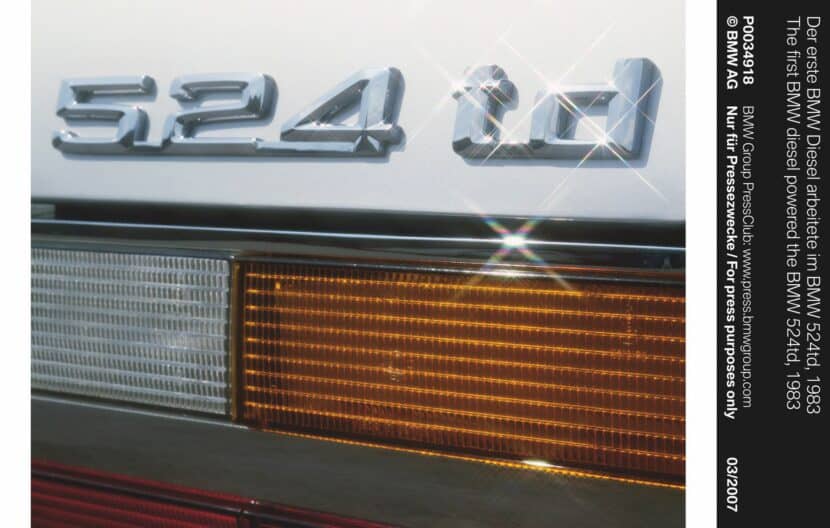
Out of nowhere arrived the BMW 524td forty years ago this year. Based on the 1981 E28 5 Series, the 524td was the result of many years work and research and had BMW been a bigger company with more production capacity, the 524td would have arrived earlier in the E12 body.
The aftermath of the 1974 oil crisis is the point at which all manufacturers knew they had to make plans for more economical cars. Diesel was going to be the next big thing and BMW were going to ride that horse. Karlheinz Lange of BMW engine development took a derisive look at what Mercedes were building and realized how those units would be utterly unacceptable in a BMW. He could do much better. The tie in between BMW and Steyr Daimler Puch AG in December 1978 allowed the essential new factory and development centre to build BMW petrol and diesel engines.
The Engine: The M21 Turbocharged Diesel
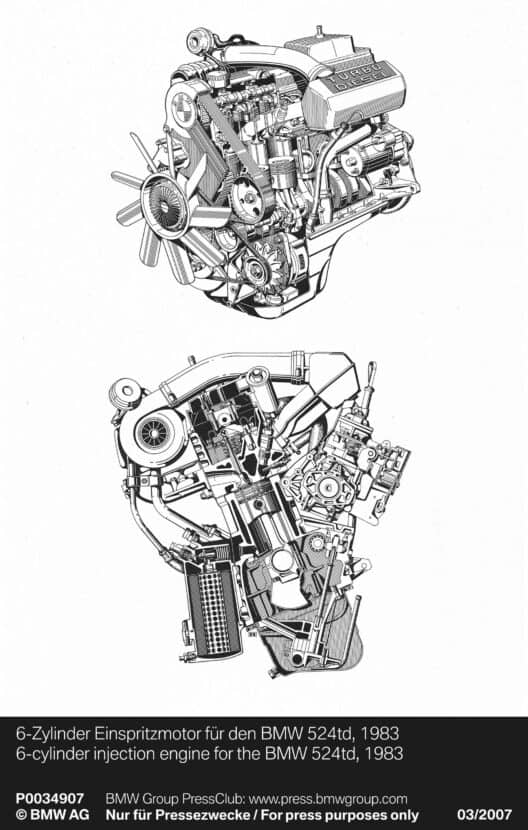
Starting in 1975, a new range of M20 small petrol sixes was developed. An iron block, alloy head SOHC engine, it was designed with both 80 mm and 84 mm bore sizes and the former would have more than enough strength for a diesel engine whose high compression ratios and cylinder pressures needed a seriously strong block – it required very few changes to be dieselized, mainly being cast from a superior grade of iron with a higher chrome content. From this modified 2 liter petrol block, the 2443 cc M21 was developed, the extra capacity drawn from a new forged steel crankshaft with a stroke of 81 mm.
Stronger steel connecting rods, diesel specific pistons with deep chambers, a higher volume oil pump and a bigger sump were joined by a new SOHC cylinder head with no combustion chambers and a thick cast alloy cam cover was used to damp out both valve train noise as well as diesel combustion sound.
Direct injection (DI) lacked adequate refinement; DI is where the injector fires straight into the combustion chamber. Instead, BMW used indirect ‘swirl chamber’ injection (IDI) where diesel is sprayed into a small chamber above the combustion chamber resulting in a much softer diesel sound.
The injectors were Delay Pintle Nozzle types, these being run at a lower pressure than DI engines, and the compression ratio was 22:1.
The Performance: Quiet, Smooth, and Fast
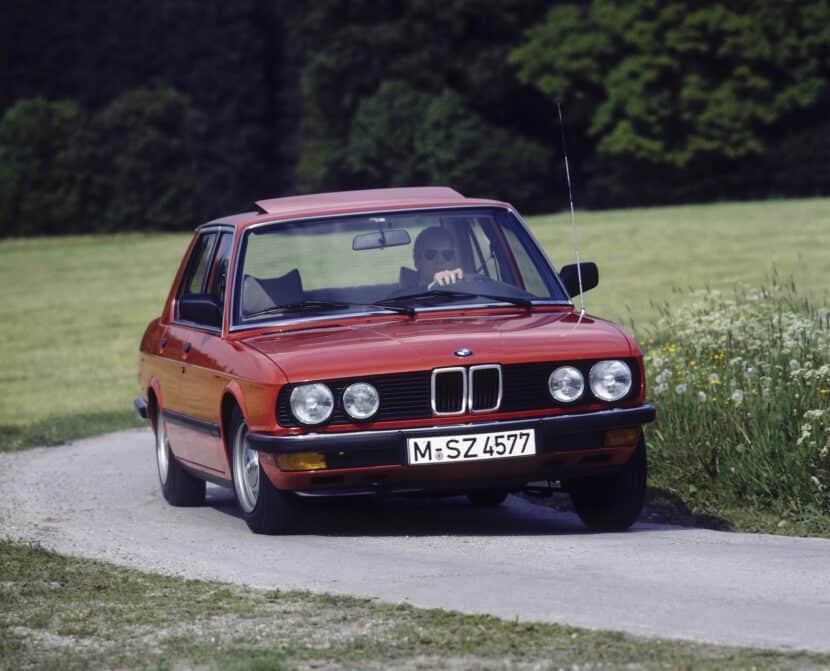
A Garrett T3 turbocharger was used to boost the fuel air mixture, and the result was an impressive 115 bhp at 4800 rpm with 210 nm of torque at 2400 rpm and this torque figure was higher than the BMW 3.5 petrol engine at the same rpm. Mounted on soft rubber engine mounts and with 9 kilos of extra sound insulation, the 115 bhp 524td was a revelation. Not only was it quiet and smooth with not much given away to a 528e or Euro 520i, it would reach 62 mph in just 11 seconds and do around 115 mph all out. 80 mph cruising required 2500 rpm as you were wafting along, doing 40 mpg.
The Legacy of the BMW 524td
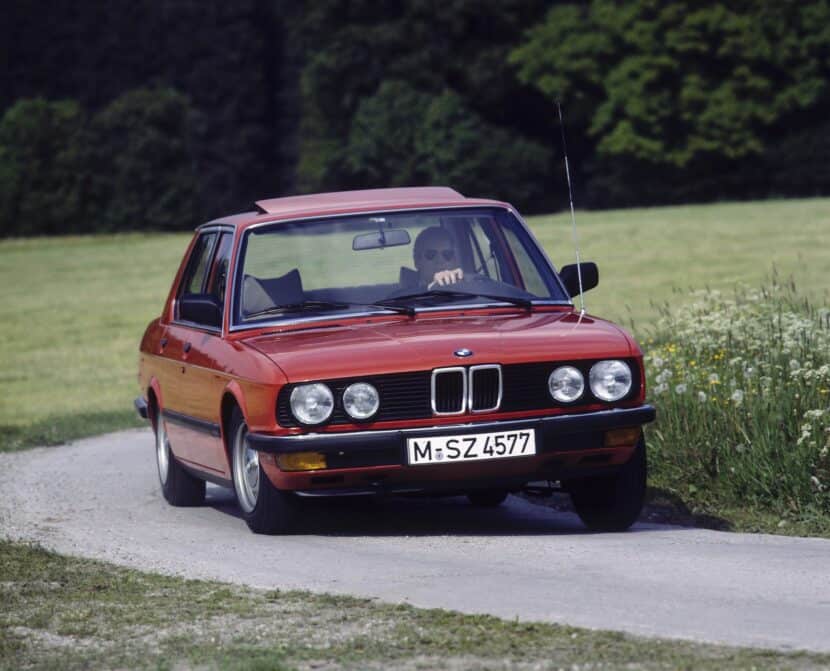
BMW’s 524td was instantly the best diesel car you could buy at any price. So well regarded was the new M21 that Ford did a deal with BMW to supply the unit to use in the Lincoln Mark VII diesel, a car that was just too big and heavy for the 2.4 litre M21.
524td production began in October 1982 and by early 1983, enough cars had been built for a model launch. A non turbo 86 bhp E30 324d arrived for 1985 and that was followed a year later by a similarly engined 524d aimed mainly at the taxi market. The full fat E30 324td arrived in February 1987 and in 1988, the second generation 524td arrived in E34 guise, now with electronic Bosch DDE (Digital Diesel Electronics) engine management.
The M21 left production in August 1991 having well and truly lit a bonfire under the diesel car market and given notice that what had passed muster before was a thing of the past. One of BMW’s mistakes however was to not import either the 524td or 324td to the UK. BMW could have set a trend in the UK for performance diesels that fitted the Ultimate Driving Machine image perfectly – and they would have sold every example with ease.

